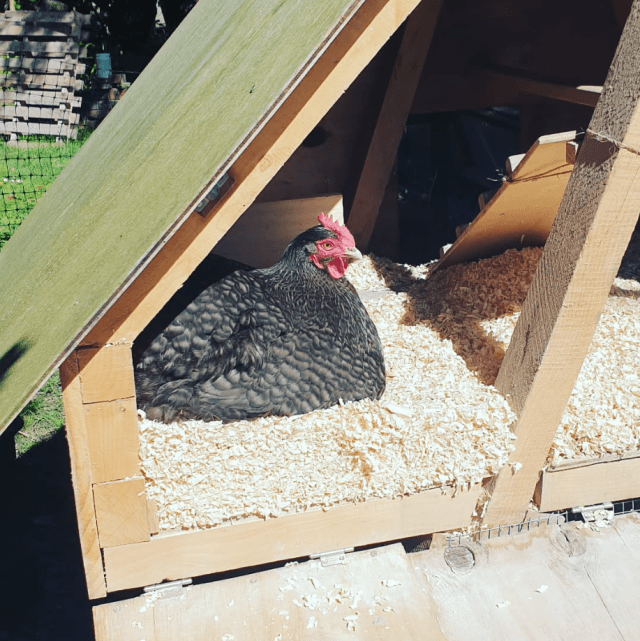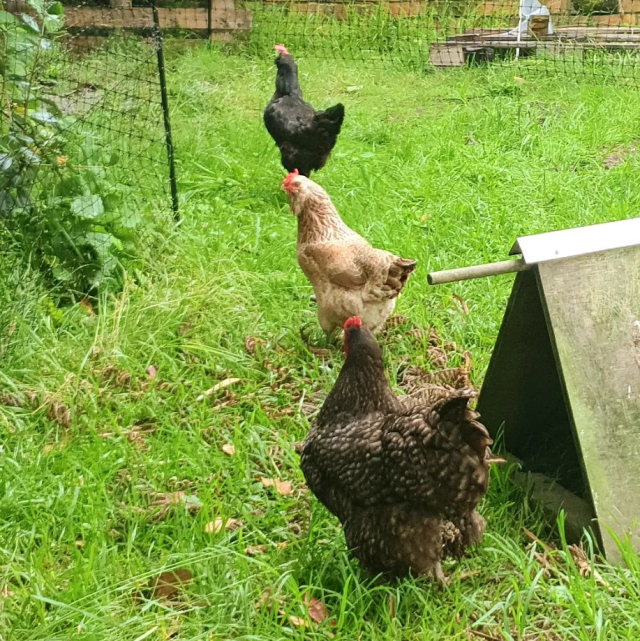
There’s been a huge influx of people looking to keep their own backyard chickens, and there’s a lot of questions floating around about what you need to consider before diving in. We currently have a sweet little flock of 6 backyard hens in the backyard of our urban 750sqm section, and I adore them!
Why keep backyard chickens?
The main reason so many people are keen to get their own backyard flock is the cost of eggs has shot through the roof and we’ve seen wide spread shortages, with supermarket egg shelves sitting bare. But that’s not the only reason it’s worthwhile! Also;
- Know where your food came from, and how the chickens have been treated and cared for.
- Get the freshest, highest quality food you can.
- Put food on the table with less impact from cost fluctuations in the supermarket system.
- They are an endless source of calm entertainment and a joy to watch and feed.
Be prepared
It’s not quite as simple as just popping out and picking up a chicken though. There are considerations to be had whenever your taking on pets or livestock. Believe me, I know.
When we originally started discussing chickens, we had weighed up the costs and the space and various requirements, but we hadn’t actually put any gear in place. It was very late one night, and I was more or less asleep, while Dan was sitting up browsing chickens for sale on his phone. He found a flock of 3 adult white Orpingtons and said “Should I buy them?”. To which I, in my entirely asleep state, replied “Yes”. He hit buy now and I found out the next morning that we had less than 7 days until we needed to collect our new flock!
Now, that’s a very amusing story to look back on, but at the time it was a massive hustle. We had to build a coop to house our birds, meet all the needs of feed and water and grit etc. in a very compressed timeframe. So my lesson to you is, do as I say, not as I do – be prepared!



What do chickens need?
Housing a Chicken Flock
Shelter: Chickens need somewhere dry, and ideally out of the wind, to shelter from the elements.
Roost: A place to perch or roost is important. Chickens have a natural tendency to sleep high off the ground, which in the wild, helps them avoid nocturnal predators like rats or hedgehogs.
Nesting Box: Chickens like a private cosy and safe space to lay their eggs in. If you can provide somewhere they feel snug, you will confidently be able to pick up your eggs from the same spot every day. However, if you don’t provide an adequate nesting box the chickens will lay wherever they feel most comfortable, and you’ll be playing Easter Egg hunt every day trying to find your eggs!
Chicken Coop Options
Often you can get a chicken coop that ticks all of those housing needs simply and easily for you.
- There are plans available online to build your own mobile chicken coop.
- Otherwise you can purchase something like an Eglu or browse the offerings at your local Bunnings or Mitre 10.
I do recommend something that is mobile, as we try to regularly move the flock, to let the ground recover and to reduce parasite pressure. Chickens can certainly be affected by parasitic worms, mites and lice so moving them regularly is good practice.



Chicken Nutrition
Water: Chickens need constant access to clean water for drinking. Any container will do as long as it’s refilled regularly. The easiest options we have found were the standard chicken drinkers or the Grandpas Drinker cups. These don’t need such regular refilling, but do need regular cleaning.
Food: We feed our backyard chickens layer pellets which contains a good percentage (15-20%) of protein and calcium. This is always available to them using the Grandpa Feeder but if you’re feeding out daily you’ll want to allow around 100g per bird. This can be less, if you’re subsidising their food with kitchen scraps or they’re foraging fresh ground for bugs. Bear in mind eggs are made of protein so the majority of what they’re eating should be protein too.
Grit: Chickens use grit to grind down their food and help digestion, especially when they’re foraging and eating things like grass. It also supplies them with additional calcium to help strengthen egg shells and keep the hens healthy. We make sure our chickens always have access to oyster shell grit, but you can also dry used eggshells and grind them up to mix in their feed.
Space requirements for chicken keeping
It all depends on how you’re going to keep your chickens. For example, instead our mobile chicken coops there isn’t very much space at all, however, they are only contained there overnight for sleeping, and nesting.
During the day our chickens roam within a large fenced run, and have more than adequate space to forage, therefore their coop doesn’t need to be very large. Our birds are not fully free range, as they will destroy the gardens! We let them into gardens into a controlled way, to clean out at the end of the season.
If there are ever days where you won’t be letting your chickens out, then they’ll need more space.
Or if you’re using a chicken coop that doesn’t move around and doesn’t have much outdoor space for them to roam, the amount of space they’ll need will increase.
As a guideline:
- Each bird needs about 0.3 square meters of living space.
- Each bird needs about 25cm of roosting space.
- If the birds will be confined in the coop then they’ll need about 1 square meter per bird.
Frequently Asked Chicken Questions
Do you need a rooster to get eggs?
No! Hens lay eggs regardless of whether or not there is a rooster around. These eggs are unfertilised, much like those you get at the supermarket. If you want to have fertilised eggs, which will grow baby chickens, then yes a rooster is needed.
How many chickens do I need?
I recommend a minimum of three chickens. Remember these are flocking animals and will feel very unsettled on their own. It’s important they have a social structure and can spend time together.
After that, consider how many eggs it is that you would eat? With three chickens you’ll likely get around 15 eggs a week as an average.
I personally, am not permitted by my local Council regulations to have more than 6 chickens on my urban property. You might have similar rules in your area?






What age chicken should I buy?
If you’re buying backyard chickens, the youngest I would recommend is a “pullet”. This is a young hen, which hasn’t quite started laying yet, but is grown up enough to determine it’s gender and for it to not need mothering. Pullets usually start laying when they’re around 6 months old.
The first year of so of laying is typically the most productive, and then hens tend to start slowing down a little over time. They will generally continue to lay through many years as long as they maintain good health and feed.
Can I hatch my own chickens?
Sure you can, here’s a hatching guide. Be aware around 50% of them will be roosters. Roosters don’t lay eggs, and depending on the rules where you live, may be illegal to keep at your property. Living in an urban area, I am not able to keep roosters. If you’re hatching eggs yourself, you need to have a plan on what you will do with the roosters.
What breed of chicken should I buy?
It depends on your goal. If you’re looking to get backyard chickens for maximum egg supply a typical layer breed will be best. Red Shavers and Leghorns tend to have the highest output of eggs, laying almost every day.
If you’re looking for pets, in my experience, the most sweet natured birds are Orpingtons but they are large and need more space. Our first flock were three white Orpingtons and they certainly taught me about the personality, the charm and the fun that chickens can bring to a backyard.
Are you planning on starting a backyard flock? Let me know your plans or questions in the comments box below!


